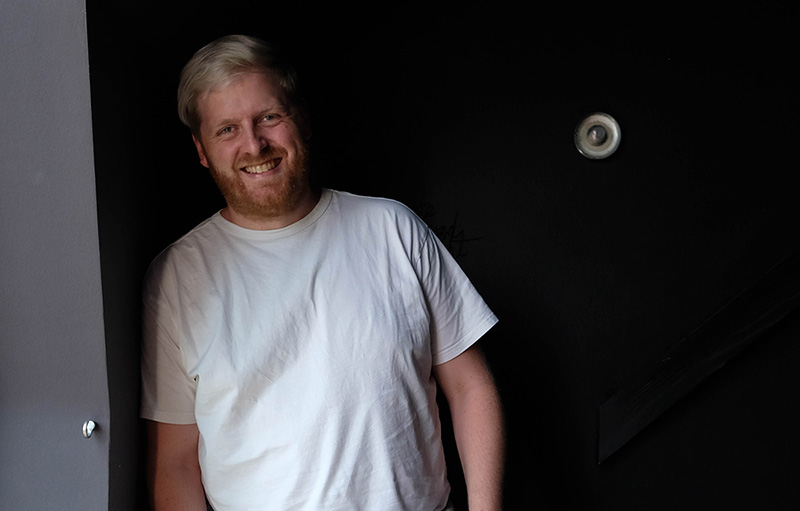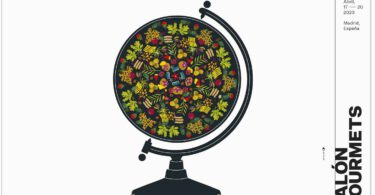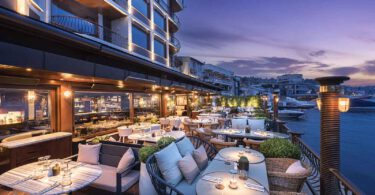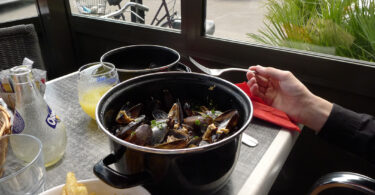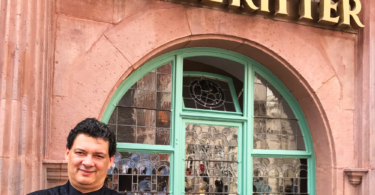His work can be simply articulated: Sustainable – Regional -Vegan.
Saward obtains his products from his own permaculture. In the small kitchen – his female employees almost tenderly describe it as “cozy” – breathtaking creations arise from it, proving to all of us how good vegan cuisine can be.
Substitute products, spices, everyday foods such as coffee and chocolate knock in vain on the door of Seven Swans, the name of the restaurant on Frankfurt’s Mainkai, which is increasingly becoming a pilgrimage site for a worldwide vegan fan community.
Beyond veganism, Ricky Saward is simply a damn good cook. If he weren’t vegan, he’d still have the star. In my opinion, his plates currently oscillate between two and three Michelin stars. But I’m not a Michelin inspector.
I had the pleasure of speaking with Ricky at his restaurant in Frankfurt. We talked for a long time about culinary arts, nature, art and anything under the sun.
Read the interview in full here. Many competing magazines would reduce the text to the bare essentials and throw the nuances into the wastebasket.
Read the interview in full here. Many of our competitors’ magazines would reduce the text to the bare essentials and throw the nuances into the wastebasket.
But isn’t it precisely those nuances that make the difference? Not everything is black or white, dear readers. Let’s take a look at our surroundings from different perspectives, let’s jump over our shadows. Regionality has nothing to do with provincialism. Ricky Saward shows us how it’s done!
MG: Hello Ricky, how are you?
RS: Thank you, everything is ok.
MG: Any vacation plans yet?
RS: Yes, there’s something interesting to report, I’m going to Jordan for a week.
People there are doing a lot of home growing at the moment. There is more than just the well-known olive oil in Jordan.
As part of World Youth Day, I will be working with young cooks, we will go out into the gardens, visit plantations, pick our stuff and cook for a small group. It’s very exciting for me because I’m “narrow-minded” about my region and suddenly I’m traveling to a completely different climate zone.
I also don’t even know what’s on the radar, the influences, etc. I am very excited.
MG: Oh, that’s very interesting. I myself have been to Israel
RS: It’s not so different culinarily, I think.
MG: Yes exactly, many many trends. I particularly liked the street food stuff. Other dishes, with Persian influences have such a “marzipan-like” undertone.
RS: Yeah, interesting. When I get back, we’ll tweak the new menu.
MG: Only one week of vacation?
RS: For now, yes, but then we’ll close the restaurant and take a proper vacation.
Still, we want to sample something beforehand so we don’t have to do a complete reset after the vacation.
RS: My day starts very early and I work every day. With very few exceptions, last week there was family visits and I didn’t give a single thought to work. However, we have been working straight through at Seven Swans since January 10.
There is a lot to catch up on. Email traffic, interviews, etc., image material, press inquiries, it all goes through me. It’s a lot of work! People tend to underestimate that.
MG: Yes, it consumes time.
RS: Someone wants a recipe etc. and I have to type it all up, I don’t have a repertoire of 1000 texts. I put in the time. It’s important to me. We had someone for the press work, was also done properly, but in my eyes not focused on Seven Swans.
Then we decided to do it all ourselves and since then it is in a completely different direction. When you keep an eye on everything yourself, it somehow works out better.
MG: You are a “control freak”?
RS: Not directly, but I do everything very conscientiously and deliberately. I don’t do anything casually but make an effort for everything.
It’s a ” complete game” we are fully booked, I do a lot of it myself. That certainly contributes to it.
MG: Booked out until when?
RS: July 2024
MG: I read something about you recently, an interview in Feinschmecker.
RS: Oh my goodness…
MG: Didn’t you like it?
RS: I don’t even remember.
MG: “After an apprenticeship in an retirement home, he decided to become a chef”, someone wrote about you there, that’s crazy.
Love at first sight? Somewhere there’s something on the oven and you become a cook?
RS: Laughs. It didn’t even last that long, this apprenticeship, I think two weeks it was.
I started work at 5:30 am. I came straight from school, physical work was not unknown to me.
However, I approached the story quite naively.
I had to get up even earlier, because I went to work by bus, which was also something completely new for me. Until then, I could reach everything by bike.
On the very first day, I got on the wrong bus, I was completely overwhelmed.
I ended up in a commercial kitchen and opened my eyes in astonishment when I saw huge kettles and tippers.
“Wow, what’s going on here,” was my first thought.
There was a huge conveyor belt running through the heart of the kitchen.
I wasn’t allowed to do anything, except maybe peel, sometimes chop something. They didn’t cook fresh food.
When it started, one of us stood at the front and put the tablets on, the other six cooks (draw inverted commas in the air with his fingers…) and me, we slapped something on it, like in jail.
Okay, I thought to myself. You do it for a few hours, then there’s a break and then you do it again for a few hours.
I didn’t think it was so bad, I imagined the work was harder, which is because my father did a lot of hard labour.
MG: A grafter?
RS: Yes, he was! At home we always had to lend a hand, collect wood in the forest, then chop and saw. The lawn always had to be trimmed. There was a structure.
That’s why I imagined work to be much more arduous.
At this point I would like to thank my father, he really trained me at that time.
Anyway, it was relaxing for me and somehow I really enjoyed it. At that time there was this cooking programme with Jamie Oliver on TV.
MG: I loved watching it too.
RS: Yes, exactly, I thought it was very cool. It was a great concept. You walk around the market, talk to people here and there, buy nice things and then cook for your friends.
RS: It all looked so easy, funny, you had fun.
The ingredients were quickly cut and stirred together, it wasn’t witchcraft. In the end, everyone was happy. That was perhaps the moment, the crux of the matter.
Last but not least, my neighbour arrived. I used to screw some pieces of furniture together with him from time to time, he was a cook.
He praised me and told me how great it would be to work as a cook on a cruiser. On the way twice a year, “lining one’s pockets with a lot of money”, that’s how he described it.
I knew that’s it. Until I finished my apprenticeship, I really wanted to cook on a ship.
In the meantime, of course, it has all become a bit more relative.
MG: It’s just great and also a little crazy that after an apprenticeship in a retirement home you decide to become a chef.
RS: That’s right, it happened in a similar way to Max Strohe, by the way.
MG: A fantastic guy, too.
RS: That’s right, I had to laugh when I read how it went with him.
MG: What do you think about when you’re not in the kitchen?
RS: That’s a difficult question. Even when I go for a walk with my family, with my girlfriend and my son, I observe the landscape very carefully.
I look for certain things in the trees in the bushes, for flower buds, for example. I am fanatical. Of course, I don’t put everything on the menu, but I find my inspiration in nature.Sometimes it’s quite strange things. For example, the visual, when a stream flows and the ripples look like a certain marbling, smells of course.
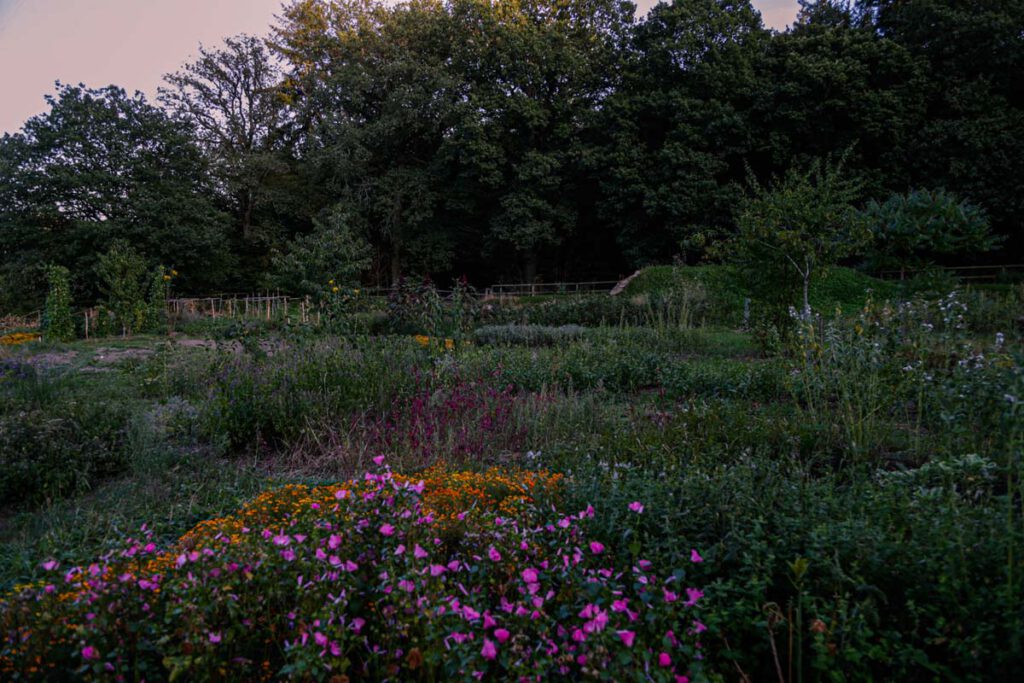
Summer rain on moss, the first leaves. In fact, I have absorbed much of this into my kitchen. The accuracy of nature, the perfection. I watch how everything grows.
MG: I hear a very sensitive person speaking and a poet…
RS: Laughs
MG: I myself am an enthusiastic landscape photographer. When I’m out and about, I’m also always observing nature, always looking for a detail or perspective that seems particularly interesting or beautiful.
RS: Yes, it’s quite crazy. Even at home, when I notice certain smells, I have flashbacks to my childhood. Often there’s a whole story connected to it. It can also be quite banal. Like when I was four years old, I was sitting outside on the lawn, petting the dog, and a certain flowery fragrance came into my nose.
I don’t know if everyone has that and I don’t usually talk about it.
I get creative when I don’t have to think, when I’m not here in the restaurant kitchen. Or on holiday, in any case the head has to be free, then the brain starts to work.
We’ve been working for half a year now without a break, so it’s very hard to be creative, almost utopian.
MG: The psyche doesn’t permit it…
RS: Yes, very difficult. I have an example.
In 2019, I co-opened the Lindley Hotel on Lindley Street.
It’s proved difficult, though, to run Seven Swans here on the one hand and Little Sister over there.
We closed the Swans for three months, there was no other way, I had to dive fully into the new stuff.
A softer concept, 80 seats, vegetarian at the time, sustainable, but simpler: soul food, finger food, you share it.
The products from Seven Swans then crossed over with those from Lindley, I was also very interested in using the same techniques in the new restaurant. We made our own miso, homemade sake, fermentation etc., but it was tough.
Creating those differences of level. At some point I made a clean cut and handed the thing over to my sous chef Niklas. He ran the restaurant for a while, but is no longer there, the restaurant is still going very well!
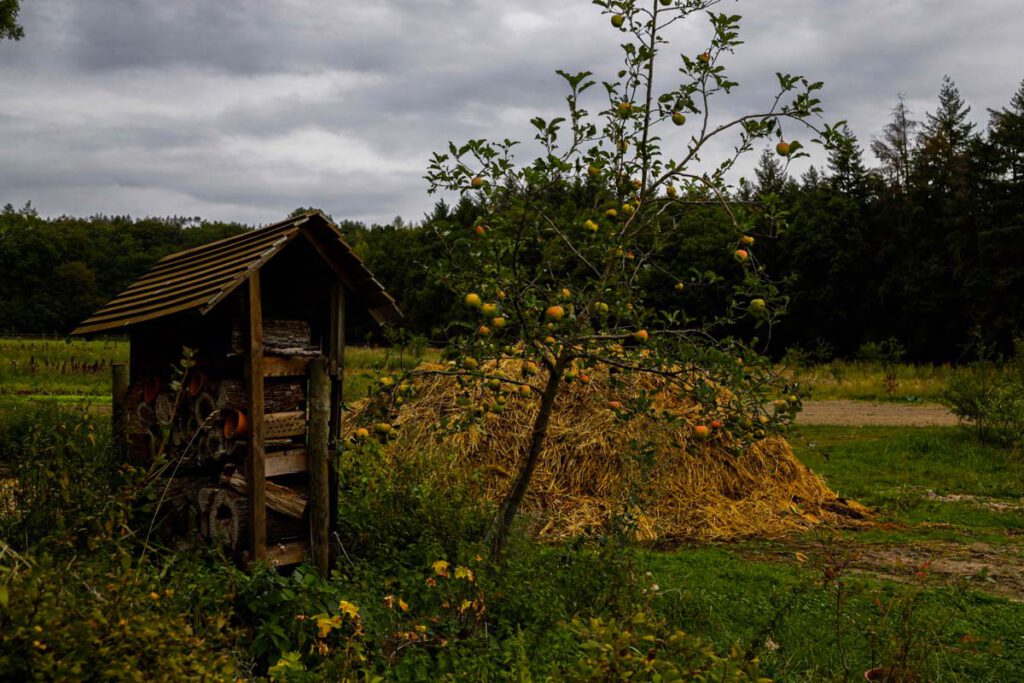
MG: Do you read reviews and how do you feel when you read a bad review?
RS: Oh, I’m very sensitive, very sentimental, I take everything to heart. By the way, in my private life as well as at work.
(thinking) A difficult question, especially when I think about how we started here in 2018. Back then I went out in the morning to our permaculture, pulled radishes, cleaned them, left everything on, just cleaned them so that everything really looked perfect.
Then I put the vegetables on the plate, added some sauce and sent them out.
People laughed at me for that kind of cooking.
MG: … insane…
RS: Yes, back then we sent out just as many courses as we do today and charged 80€, yet there were guests who complained about the price.
MG: …the zeitgeist…
RS: It was a style that you see today wherever this farm-to-table is practised. It’s very fashionable. I take a perfectly grown product from the ground and let it speak for itself. It didn’t work for us, we had three to five guests per evening, it didn’t pay off. There were even complaints about the price at the time. For years we were in the red.
We then asked ourselves: What should we do, what should we change?
We then talked to the investor we had at the time.
It turned out that he wanted to get out of the star gastronomy business. The restaurant was closed, which was a pity for me because I had only been there for barely two years.
But something happened that I felt was pretty cool. The investor took me aside and said:
Okay, Ricky, the issue is chewed, on New Year’s Eve we’ll have a big wrecking party and that’ll be it for the end. Until then you are free to do whatever you want here, is that an offer?
former owner…
MG: Fantastic!
RS: That’s right, theoretically I could have started with meat here then. ( roaring laughter)
But the decision was quickly made, we will do without the last animal products, milk, cream and eggs from now on and convert everything to vegan.
I took my people aside and told them:
“Let’s just become the first vegan restaurant with a star, if it doesn’t succeed, fuck it, we’ll close the place down anyway.”
told that to the investor, who looked at me in horror, pulled his hair out and asked me:
Are you insane, do you want to drive away the last three guests who still stray to us?
It has to be said that the issue wasn’t that present at the time, there were hardly any substitute products. And certainly not in Frankfurt.
MG: At that time there was a “chef” who is now on the run and sold many books on the subject.
RS: Yes, a very small voice.
Anyway, the investor let himself be persuaded and we then brought the whole thing up under the radar, didn’t communicate at all, etc.
So we cooked vegan for half a year without even telling people, masquerading as a vegetarian restaurant.
MG: Very good plan, very intelligent.
RS: Yes, it went very well, for me that was the starting signal for our next steps. We only informed the Michelin Guide, Gault Millau etc.. We didn’t want to leave the testers in the dark.
At the beginning of 2020, it became official and soon afterwards we got the Michelin star. But as fate sometimes wills, Corona intervened and suddenly we were missing an important stage.
At the same time, Claire Vallée appears out of nowhere with her vegan restaurant ONA in France and gets a star right away, but later than us.
Michelin France, that’s an even bigger number than here. She managed to get into the headlines with a fantastic press distribution.
That annoyed me. After all, we had the star before. I then managed, with a lot of effort, to successfully spread this over the press.
There is a lot at stake.
By the way, the ONA closed again just one year later. Yes, it is a long and hard road until today.
MG: The episode fits well with my next question: Are you happy?
RS: Before Christmas, some school children were sitting here asking me questions. They were working on a project about vegan cooking.
At the end they surprised me with the question: Do you enjoy cooking?
MG: A good question, why didn’t I think of it?
RS: I couldn’t answer the question at the time. It’s really hard to put happiness into words, especially when you’re in the profession of cooking.
At the end of the day, it’s a job. We don’t cure cancer, we’re not heart surgeons, we don’t change the world.
We are cooks and we all boil with water. Some drift away, become stuck up, arrogant, unbelievable if you think about it.
I would probably be happy if I was a heart surgeon and could save lives every day.
That’s a whole different basis, I could go home proud and say: today you’ve done something for people again.
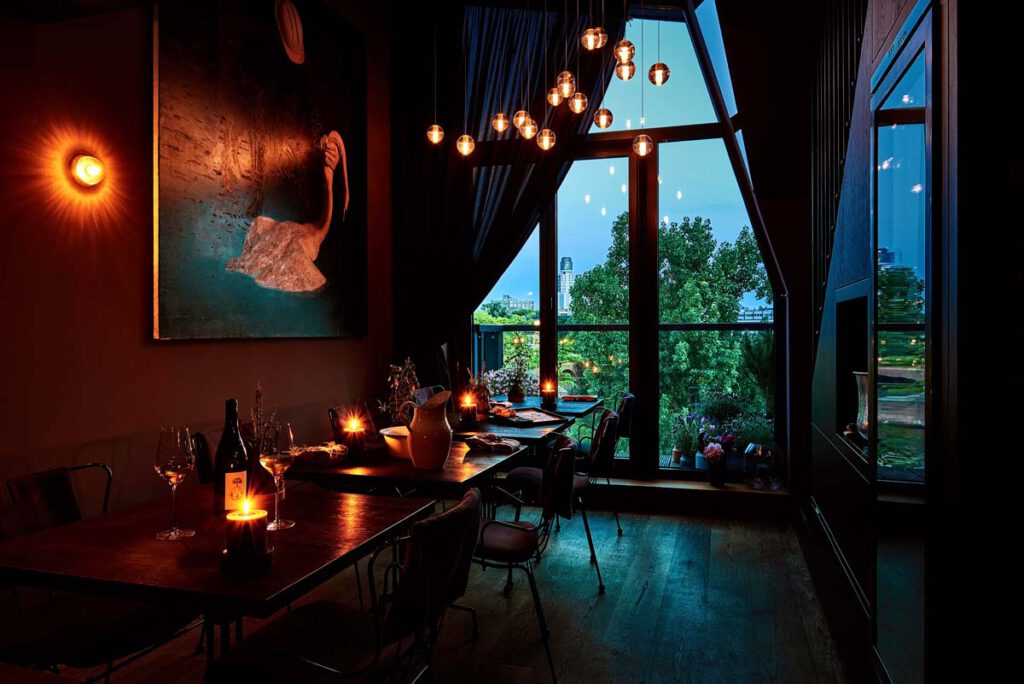
MG: You make people happy with your cooking…
RS: But anyone can cook at home. I even find it scary when people come to me and say:
“I’ve been cooking vegan for 40 years, but that was the best meal of my life.”
It makes tears well up in my eyes and I ask myself, “Guys, what have you been doing for the last 40 years?”
If you’ve been with something for that long, you’d really have to come here and say, “That was the worst meal of my life.”
MG: But it’s different when you deal with it at home. Who has the time to do that kind of level?
RS: That’s true, but at the end of the day people pay money for a meal, it’s very transient. An architect can look at the house he built for the rest of his life, that’s something completely different.
I am happy in short moments when I arrange something, put on the last tablespoon and pass the dish. But that goes hand in hand with my expectations, it has to be right, it has to taste good.
MG: That’s my luck as a journalist. I can assure you that this interview will last.
RS: That’s true, of course. All my life I’ve set myself goals of winning competitions, conquering stars and so on. When you have achieved that, there is a certain emptiness.
Recently I had a long talk with Robert Rädel from “OBEN” in Heidelberg. It was about the 2023 star award.
We talked routinely about the topic.
Last year, it was quite different, a great euphoria. The longer you are in this cosmos, the more the magic disappears.
As a chef, you can assess yourself very well: have you got worse, have you got better? You have a feeling for what you are doing. When you’re burnt out, when you can’t think of anything else, you have to make a cut, pull the ripcord.
Disappointment, and thus burnout, is more likely to come when you don’t achieve a goal you’ve set for yourself. Especially if you are as good, or rather at least as good, as others.
For a long time I made the mistake of comparing myself with others, until I finally came to the conclusion and realised:
You must not and cannot compare yourself with others. Especially here in Germany! Who are we, what do we cook, how do we cook? What is the setting like, what do the ceramics look like? What is our philosophy, is there a common thread? It’s completely different and especially difficult for a tester in my eyes, didn’t we have this conversation recently?
Someone is supposed to come here and evaluate freely, I don’t think that happens.
There are some that are always hyped, are evergreens, and will be until they are no more. Only then is there room for new people.
There’s great talent out there that I think is underrated. A rehash of tradition. A few are always at the forefront. When I go out to eat there, I do ask myself: who decided that?
Isn’t it time for change and for a more colourful culinary experience in Germany? Do we still have to maintain and elevate this old-fashioned cuisine?
MG: You mean a French culinary art with German accents?
RS: Yes, in principle.
MG: That’s interesting. I don’t know if you’ve ever heard of Karlheinz Stockhausen. A contemporary composer who at the time first broke up conventional classical music in a serial way and then replaced a lot of it with electronic music. A revolutionary. He also felt like breaking with tradition.
RS: The culinary culture has been lost. It’s clear that the big chefs set the pace. But we have a lot of possibilities to make things very different, just the differences from state to state, the different styles.
Why don’t we start to generate our own signature?
MG: A good bridge to the next question:
Many vegans once were carnivores and don’t want to give up their former habits for the comfort of it. That’s why there are vegan burgers, vegan mince, vegan kebabs and much more. A huge, industrial mass market.
Isn’t it about time someone came along and shout out to the world:
“Stop finally eating fakes!”
Are you the right person to tell people that veganism does not mean asceticism?
RS: (thinks long time) No, society is already too jaded. I actually see it that way. You can’t change the habits of a lifetime. That’s always been the case. These substitute products are not bad at all (by the way, I worked on a documentary about this very topic, you can watch it on Arte). Among other things, the documentary deals with the active ingredient carageen, which is used almost everywhere.
MG: A thickener…
RS: Exactly. Carageen has been shown to cause cancer. But I want to say something completely different.
It’s perfectly fine if you say, “From tomorrow I’m vegan!” I even understand if you go to the grocery shop and get your vegan schnitzel because you need something like that once a week.
I understand that. But you should use it as a bridge to get into real vegetable cuisine. However, you should have no illusions that a longer-term diet with these substitutes is highly unhealthy.
And here we are again with the “jaded society”, you take what you know. Everything has to be done quickly, no matter in what area, nobody takes the time and cooks at home, you just do things easily.
That’s what’s happening throughout society, that’s what we’ve been trained to do.
Very few people know what good quality actually means. One example: the farmer’s markets.
They should be regional, local producers should have their stalls there.
You have to start drawing attention to such problems in kindergarten. Planting beds, preparing the kids theoretically for the future. They have to learn what is healthy and what is unhealthy.
In my school days, the villain was called Nutella, the teacher put a jar down and next to it a huge pile of sugar cubes.
MG: With us it was Coca Cola.
RS: Yes, also a lot of sugar…
MG: As a militant perfectionist you are practically never satisfied with a result. How do you get through that without getting depressed?
RS: Some people think I’m depressed. But for me, being depressed and being a perfectionist are two different things. On the other hand, both states are close to each other.
I don’t go home thinking that everything was shit today, but that you didn’t do something perfectly, you could have done it better.
Maybe there were one or two days here where I thought it was great.
I’m not depressed. For me, perfectionism means 100%.
Many factors play a role. We’re not just talking about cooking, it’s about much more.
How were the guests, how was the interaction with the guest? Were all the guests happy, was the tip good? Were the products perfect, was everything there in the morning when they were picking?
That’s a complete day for me, rarely perfect.
An unattainable goal, the perfect day. On the other hand, it’s nice that it is. It spurs us on to always go the extra mile, improve details, etc.
That is a basic idea that has brought me to where I am today.
MG: The Michelin scene is a kaleidoscope of vanities. Are you vain yourself?
RS: I used to think about it a lot. How do I come across, what do others think of me? Even when I was at school, it was important to me what others thought of me.
Feedback was also important to me after my first TV gigs. I read critics and reviews from the first page to the last.
The next day I went to my father and lamented:
“there’s one, he insulted me, doesn’t he like me?”
At the time, I didn’t really understand the situation. In retrospect, I think:
“the internet is full of plague, people express themselves anonymously and abusively there”.
In the meantime, I am more relaxed. Nevertheless, I wear my thoughts on my tongue.
If I don’t like someone, I show them relatively quickly.
I’m also too good for this ass-kissing that is omnipresent in the scene.
MG: What do you mean by that?
RS: There are a few journalists who processed on my person, it wasn’t about the cooking.
People who write about me without knowing me are history for me, no matter what status they enjoy in journalism.
Some representatives of the guild have tried to get at me by all means, I ghosted them. That has happened before.
MG: In principle, this is stalking…
RS: Yes, at the very beginning we did experimental press work. We were newcomers and dealt with the topic in a very relaxed way. There was also a good pinch of sarcasm. It was a kind of sandbox game. But it’s clearly about respect.
I recently talked to Andreas Rieger from Michelberger in Berlin about this.
His statement: “You did everything right Ricky, keep going!”
I don’t invite testers anymore, I don’t care what they write. In the end, the guests come and the restaurant is busy.
MG: Everyone has ups and downs in their life.
What moments of happiness and low points have you experienced?
RS: I wouldn’t associate the moments of happiness with gastronomy. When we have fun, I’m happy. At my home is the most important thing, of course, at the moment unfortunately a bit little. Everyone knows the staff shortages. I hope that things will work out and that I will finally have more time for my family. But I see light at the end of the tunnel, I’ll manage.
You can’t accept everything any more. But that’s hard for me because sometimes I think the hype could be over tomorrow.
MG: I don’t think so…
RS: Still, I don’t want to be shocked and fall into a deep hole when that really happens. A good example are rock bands, that can go well one day and suddenly it’s over.
MG: That’s right.
The Feinschmecker writes:
His motivation for the renunciation: to protect the climate and resources, to promote animal welfare. But he is also driven by ambition and a pioneering spirit; he wants to deliver the “most sustainable star cuisine”, to prove to guests and the world that you can cook Champions League without caviar and Wagyu; that you break boundaries by setting yourself limits.
Feinschmecker about Ricky Saward
These lines immediately reminded me of a statement by Ferran Adrià, I think he writes this in “el Bulli”:
At elBulli we thought about the limits of gastronomic experience, consequently we had to think about life, knowledge, creation. We cooked to build new paths, sometimes they were dirt roads, sometimes they were big motorways. Until 1996, haute cuisine was directly associated with expensive products: Foie gras, lobster, caviar. Who would have ever ordered a tomato in a first-class restaurant? That year we served our creation: Tomates en texturas, the success was overwhelming! With this dish we wanted to prove how to take a simple product to a higher level through creativity and with the appropriate techniques.
what Ferran Adrià once wrote
Are you both revolutionaries?
RS: Do not compare me with him! Adrià is genius and he is absolutely right. You can even adapt the statement to a tough piece of meat, rubbish in the broadest sense.
MG: Let’s keep to the vegetables…
RS: But you see what has become of the idea, luxury cuisine is more present than ever.
MG: Absolutely…
RS: Who would dare to serve a tomato in this form in their restaurant, nobody! Luxury products are present like never before.
You don’t have to cook creatively to get a star. Juggle a few luxury products, put them on the plate and cash in.
Even renowned addresses sometimes use house cooking and street food to fill their coffers. It’s also easier to get a table there.
MG: Unbelievable…
RS: On Sundays, even the top chefs offer special delicacies.
MG: A schnitzel day?
RS: Yes, to make money.
Maybe haute cuisine no longer meets the taste of the young generation. I think I am contemporary. I am also happy that we dared to take the step in the other direction. However, with this kind of cuisine, as we live it, you mess yourself up in the head.
Every year we reinvent ourselves, simply because we always have the same products.
The climate changes, of course, and other things become possible. Even Szechuan pepper is possible now. But we are more traditionally afflicted, we take products that people know, everyone has already eaten them. We then try to celebrate the product in such a way that the guest feels the wow effect.
That is exciting. You attract people here because of a carrot.
MG: Could you compare it to a painter who always creates new paintings with the same colours?
RS: Yes, exactly, and that’s what makes it so challenging.
To always reinvent oneself, not to repeat oneself. Colleagues also tend to underestimate this.
“Oh, he only cooks with vegetables,” is what I hear. People, come by and try the dishes, then we’ll be happy to talk about it. We’ve been around for five years and no colleague has been here since.
MG: Remarkable
RS: Personally, I have a fundamental interest in what others are cooking, I find that exciting.
MG: I thought that in the scene you observe each other a little bit.
A good example is Martin Scharff in Heidelberg, an excellent chef who has been in the business for a long time. He also looks after the JRE (Jeunes Restaurateurs).
They exchange information there.
RS: I don’t know why, maybe fear of getting involved in something new? Maybe people don’t want to admit that vegan cuisine can be very good.
We cook with much fewer ingredients, still have a star and the place is full.
Maybe this recognition is painful.
It is also difficult for the tester. For example: you go to Erno’s Bistro today, or to Lafleur or Gustav, and the next day you have dinner with us.
The difference in products is huge, there you have Wagyu, caviar, lobster, butter, sauces made from bones, and so on. And here?
Onions, leeks, carrots, celery. The counterpart.
It should then somehow come to mind to the inspectors or the tester. According to the motto: “Wow, how is that possible?” We always have to go one better than the others, although what we do here is very remarkable per se, if I may say so.
MG: I can only agree with that and lead straight into another question that fits well with the topic:
You cook without spices and strictly regional. Even everyday foods like coffee or chocolate are taboo.
Aren’t you blocking an infinite flavour universe?
Sustainability has to be at the top. That’s always been very important to me, below that comes regionality and below that comes veganism.
MG: Interesting.
RS: For me, these three things only work together. Otherwise I don’t change anything. Being vegan without sustainability or regionality doesn’t do anything. If I cook sustainably, maybe spices from overseas will still be used.
MG: We are on a political level, do you have an opinion about the “Last Generation” people?
RS: I don’t think it’s that bad, but I don’t go out on the streets myself. For me it was always about taking the right path, not making myself vulnerable.
Regional and sustainable has always been very important to me. Veganism was the most recent addition. We simply banned butter and milk, excellent organic products from the Demeter farm, the products simply no longer made sense in the overall package.
MG: Autarkic production. Is pine cone still your favourite product?
Again from Feinschmecker:
“Ricky Saward’s favourite product, the pine cone, simmers in sugar syrup for up to six days until it becomes a kind of liquorice, with a resin freshness and citrus aroma.
MG: It’s not just a question of favourite products, but whether you are a scientist. Aren’t they test series, experiments?
RS: Good question, but let’s go back to Adrià. You take things away from yourself and then become really creative. You dig into yourself and suddenly you are in the subject.
At some point you also do without the spices.
The theme has always been a mystery to me. You have a simple but good product and you sprinkle pepper on it, I’ve never understood that. Why do I need something spicy with an intense flavour of its own? Basically, spices change the product. But I don’t want to adulterate a good product. Leave the product as it is, concentrate on its own flavour, make it as intense as possible.
That’s the only way we got to where we are.
We took things away and thought about how to continue.
The end result is a product that you’ve never tasted like this before.
Of course, it involves technology, fermentation for example. We don’t make it easy for ourselves, but ask ourselves what’s out there.
For example, I love lemon juice, a wonderful product. But I don’t need the acidity in the Beurre Blanc.
MG: It probably states so in Escoffier.
RS: It may well be, but there are many other ways to control acidity, with wine, with vinegar, fruit-based…
MG: …with verjus
RG: …yes exactly. Here in the forest these little wild quinces grow wild, they are very bitter. But when fully ripe they come very close to citric acid, great taste.
Summer and autumn fruit varieties are fruity, there’s really plenty. So much for the spices.
Now for your pine cone. With it, you broaden your spectrum, you inform yourself, read specialist articles, etc. Do you know Wolfgang Dieter Storl?
MG: Knowledge gap!
RS: A real guru, an oddball, long white beard.
One day I asked him what these golden bells (Uvularia grandiflora, editor’s note) were all about, whether they were poisonous, etc. He said, “I’m not sure what they are.
Wolfgang Dieter Storl got in touch with me and said that the plant is used in Asian medicine as a remedy. They make a tea infusion from it.
There are many plants that are considered poisonous here, but elsewhere they make jam out of them.
It always depends on the quantity, as with nutmeg.
Currently we have raw potato on the menu, people say? Raw potatoes are poisonous! Only yesterday a young woman asked me about it.
We don’t want to poison you,” I replied. “To come to serious harm, you would have to eat at least two kilograms of raw potatoes.
It is about the notorious solanine, which is removed from the potato by cooking, except for a small remaining volume.
MG: A completely different topic, I asked myself whether I should ask the question at all, wavered for a long time, but it is important after all, it is about art.
Once again a quote, this time not from, but about Ferran Adrià.
“I invited Ferran Adrià because he has managed to create his own aesthetic, which has turned into something very influential on the international scene. That’s what I’m interested in, not whether people think it’s art or not. It is important to say that artistic intelligence does not manifest itself in a particular medium, that art does not have to be identified only with photography, sculpture and painting, etc., nor with cooking in general; however, under certain circumstances, it can be art.”
This is what the Artistic Director of Documenta, Roger M. Buergel, wrote when he invited Ferran Adrià to the much-acclaimed world show of art in 2007.
This is what the artistic director of Documenta, Roger M. Buergel, wrote when he invited Ferran Adrià to the much-acclaimed world show of art in 2007.
Is cooking art? Perhaps even a particularly fascinating art form, because we can practise it every day, because in principle everyone lives out creativity with it in their own way, meaningfully or not?
RS: (thinks) Ephemeral art. The word is perhaps too much. But I smile a little when people call my kitchen art. The process seems a bit too short to me, although of course a lot happens in the mind. An artist imagines something and then reproduces his thoughts. I combine in my head and then bring it to the table.
MG: Which brings us to another question from my catalogue:
You already compose dishes in your head. That also applies to Wolfgang Amadeus Mozart and his music, he simply wrote down many compositions, it’s like magic. You find practically no correction marks on his sheet music.
Is this gift innate?
RS: Awesome!
MG: Yes, I was allowed to look to music sheets of his in Vienna, no corrections. It’s completely different with Beethoven, everywhere there are wild corrections, overwritings, crossings out.
RS: It’s the same with me as with Mozart.
I sit at home and create a mind map, in terms of colour, taste, so what depths do I go to, where are the acids. Sweet, bitter, tart. Green aspect, crunchy.
Then fermented again. I put it together and just imagine the visuals. Then the dish is ready.
MG: Reminds me of the theories of Jürgen Dollase. He adapted terms from electronic music for culinary art. Attack, plateau, decay and sustain. These are used to illustrate states in the mouth and brain during degustation.
RS: That’s already in there with me. Now you’re going to laugh, but I’m always very surprised by the dishes. I write something down, we cook, it works.
When I write something down or draw it, it’s plausible and logical for me, I connect nuances in my head, it just makes sense to me. In my imagination and in reality, the dish works.
MG: I have a culinary memory that allows me to recreate dishes that I have tasted somewhere from memory exactly one-to-one.
RS: Of course we still adjust a few things, reverberation as you just said, maybe a bit more umami. But the basic structure always works. I can rely on this discipline, in my youth it was more like a mixture of ingredients.
You need to understand how a plate works, intermediate segments, for example. You have to connect different products with bridges.
That is perhaps the trickiest thing in a chef’s career, to understand that. What bridge parts do you use, how do you use them.
MG: Is there a creation you are particularly proud of? A signature dish?
RS: (thinking) The signature dish thing has become very established, not least through television, I don’t like it that much. The other day I cooked for a Tim Bengel event. Tim is a world-renowned artist who does a lot with sand and gold.
It was an art exhibition where, among other things, the theme of cabbage and its marbling was present. The organiser asked me what I would like to cook. The only thing that immediately came to mind was potatoes, because they fit the exhibition like a glove. He also thought it was great.
I myself find signatures terrible.
For me, it’s stagnation, it bores me, it doesn’t make me happy any more.
But I admit that the potato has established itself. Maybe also because I ate potatoes every day for 14 years of my life.
My mum loves them, I couldn’t see them any more at some point. It’s a good gag, come to think of it. I had already banned potatoes from my life. But then here we had them in abundance.
I then made the friendship with it again, made up differences. It’s a great product, the way we’re serving it right now is very exciting. I use the example of the potato to show how a cheap product is celebrated. Very multi-faceted.
MG: What’s on the menu at the moment?
RS: I won’t tell you. But I do have one episode about it:
In 2010, there was a concert by the band Daft Punk in Paris.
Out of high spirits, I watched the concert online beforehand, thinking that the line-up in Düsseldorf would surely be different from the one in Paris.
No way. In Düsseldorf it was a 1:1 copy, on the tour of course they do their thing everywhere. It was a huge disappointment.
MG: I think so.
RS: But then I realised that something like that can’t happen in a restaurant. If you don’t tell people what’s for dinner, they get nervous. So we banned the menu, of course that’s gambling.
MG: Your website is also mysterious…
RS: It’s intentional…
MG: …I thought so.
RS: There are restaurants out there that polarise very loudly, usually you walk out disappointed.
Which brings us back to Signature. You know all the plates already, tastes average, even el Celler de can Roca didn’t knock me off my chair, you can’t say that out loud.
These dessert wagons are pushed everywhere, as if you were in Wonderland.
Then on the plate…I would have expected much more around it.
In the meantime, I let myself be surprised, I don’t inform myself beforehand. It’s much better, otherwise you ruin a lot.
MG: Ricky, that was a nice conversation.
RS: Definitely, very exciting, very exciting questions.
MG: You shared with us your thoughts about your restaurant and the scene. Thank you for that!
![[:de]Grandgourmand, Travel, Food, Lifestyle[:]](https://grandgourmand.de/wp-content/uploads/2023/01/logo_23_1-1.png)
